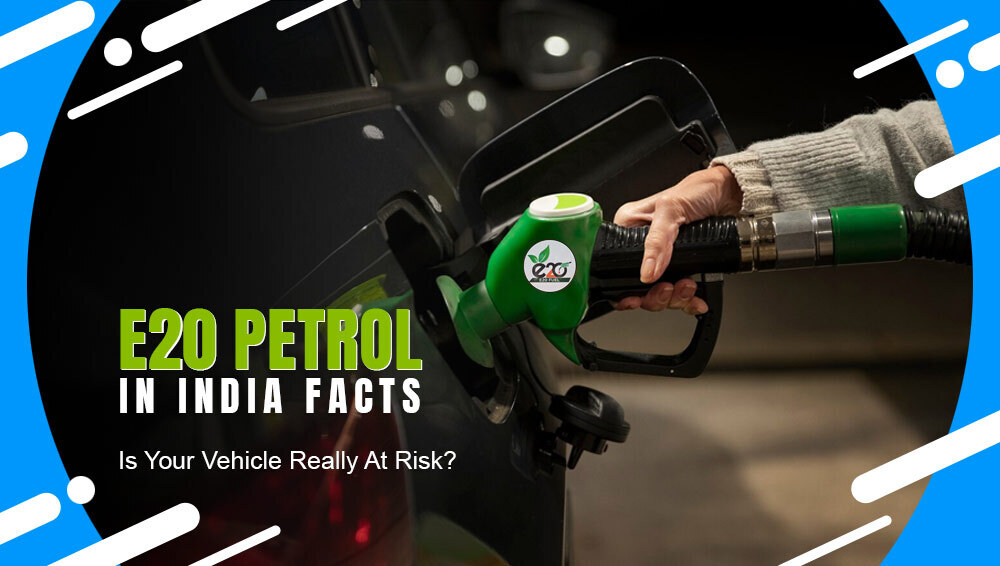
E20 Petrol in India Facts - Is Your Vehicle Really At Risk?
Soumi Roy 26-08-2025
Table Of Content
So, since E20 petrol was officially introduced in India, the action has undoubtedly caused quite a lot of commotion among petrol vehicle owners in India.
The majority of Indian petrol vehicle owners have expressed their concerns about how ethanol-blended petrol has negative long-term effects on their vehicles.
The following sections will break down the facts surrounding E20 petrol in India.
Let’s get on with it now, shall we?
The Risks & Concerns Around E20 Petrol In India
Automotive experts have put forth the following concerns regarding the nationwide usage of E20 petrol in India –
- Material Degradation – As ethanol is a corrosive solvent, it is natural for it to degrade certain rubber and plastic components such as such as seals, gaskets, and hoses, generally found in the fuel system of modern vehicles. If left untreated, this can lead to fuel leaks, brittle hoses, and cracked seals.
- Corrosion – Ethanol is hygroscopic, which means that it absorbs water from the air, leading to the formation of a separate layer of water inside the fuel tank, which, if left untreated, can lead to the corrosion of all metallic surfaces that come in contact with this 20 % ethanol blended petrol.
- Drastic drop in fuel efficiency of vehicles – Ethanol has low energy density compared to petrol. Hence, when ethanol is mixed with petrol, the overall energy density of E20 petrol goes down. The outcome is that a vehicle will burn more fuel per kilometer leading to 2-5% drop in mileage (for non-compliant cars). Others Source : How To Care For A Non-E20-Compliant Car?
- Drop in overall performance – Non-compliant engines will suffer from rough idling and problematic cold starts!
- Warranty Concerns – OEMs, service centers & spare parts manufacturers may deny warranty claims, even when a vehicle health report shows visible signs of damage, even when the vehicle’s part that got damaged is within the warranty period! On the other hand, insurance companies may deny insurance payouts!
The Government"s Stance & Reassurance Regarding E20 Petrol In India
Well, as a norm, the Indian Government is strongly promoting E20 petrol by highlighting the economic as well as environmental benefits of blending ethanol with petrol. On the economic front, blending ethanol with petrol will allow India to significantly reduce its crude oil imports. On the environmental front, increasing ethanol quantity in petrol can supposedly push India closer to its carbon emission capping goals.
The GOI, through its Ministry of Petroleum and Natural Gas and bodies like the Automotive Research Association of India (ARAI), states that damage to older vehicles is not immediate, nor catastrophic.
On the other hand, the same claims are being countered to some extent by OEMs, insurance companies, NITI AAYOG, and OEM service centers, where the industry experts are putting out the facts in the form of how old vehicle owners would need to replace inexpensive rubber parts and gaskets, periodically during regular preventative servicing sessions.
Citing the higher octane value of ethanol, the Indian Government, as well as the spokespersons of the Indian automotive industry, are also claiming that E20 petrol improves engine performance and reduces knocking in modern high-compression engines designed for running on E20 petrol!
Indian authorities are also referencing how Brazil has been using E27 petrol across the country for decades without witnessing widespread mechanical failures among the nation’s vehicles plying on its roads.
How to Check Your Vehicle"s Compatibility With E20 Petrol In India?
Here’s the deal: if you have bought your car after the financial year of 2023, then your vehicle is E20 compliant. So for the time being, the long-term effects of 20% ethanol-blended petrol will not manifest in your vehicle.
However, if you own a vehicle from the yesteryears (yes, unfortunately, even a 2023 manufactured vehicle has to be considered as an ‘old’ vehicle), it is best to periodically subject the vehicle to professional-grade car inspection sessions. Periodic vehicle check sessions, by OEM-certified technicians, can help you prolong your vehicle’s operational life.
On the other hand, you can refer to the vehicle history of a pre-owned vehicle before buying it. The outcome is that you can gauge that the vehicle is worthy of your hard-earned money and not riddled with electromechanical issues, stemming from the use of E20 petrol!
To check your vehicle"s compatibility with E20 petrol in India, refer to the user manual of your vehicle. If the manual explicitly states that your vehicle is E20-compliant, then congratulations. If that is not the case, then alas! You can now expect the servicing bills of your vehicle to be ‘fat’, henceforth!
If you are unsure or need more information, then contact the manufacturer of your vehicle or the OEM service center.
E20 Petrol In India - Is Your Vehicle at Risk?
Long story short – the risks associated with the regular use of E20 petrol are not dramatic to state the least. Instead, you can expect your pre-2023 manufactured vehicle to lose its fuel efficiency gradually. At the same time, the wear and tear of rubber hoses, plastic parts, and metallic components that come in direct contact with 20% ethanol-infused petrol goes up.
Taking note of these issues, a recent PIL was filed in the Supreme Court of India with the primary demand being the availability of ethanol-free petrol, as a choice so that vehicle owners can at least, fill up the tank of their vehicle with pure fuel, instead of blended fuel, even if the price per liter of pure petrol, will obviously be high!
Stay tuned as we will be updating this blog periodically as this story unfolds!